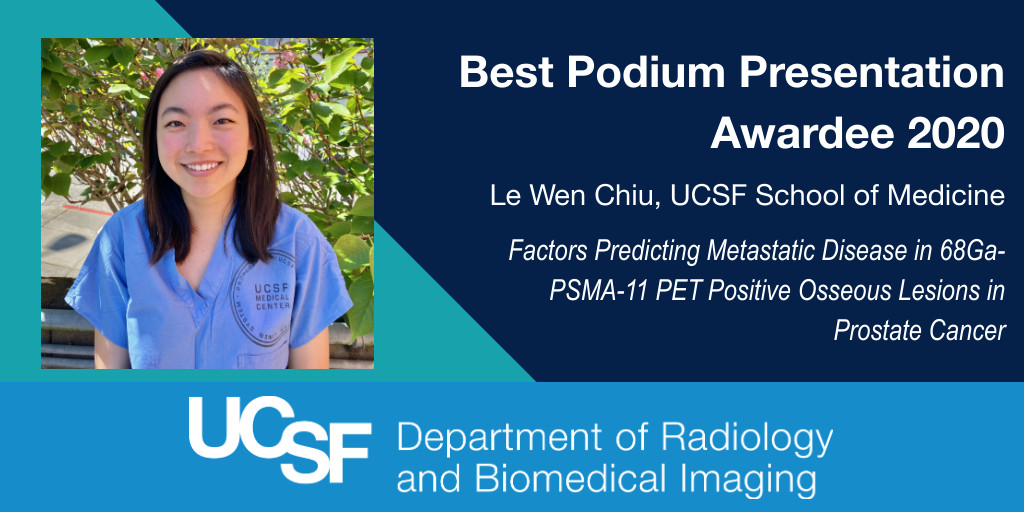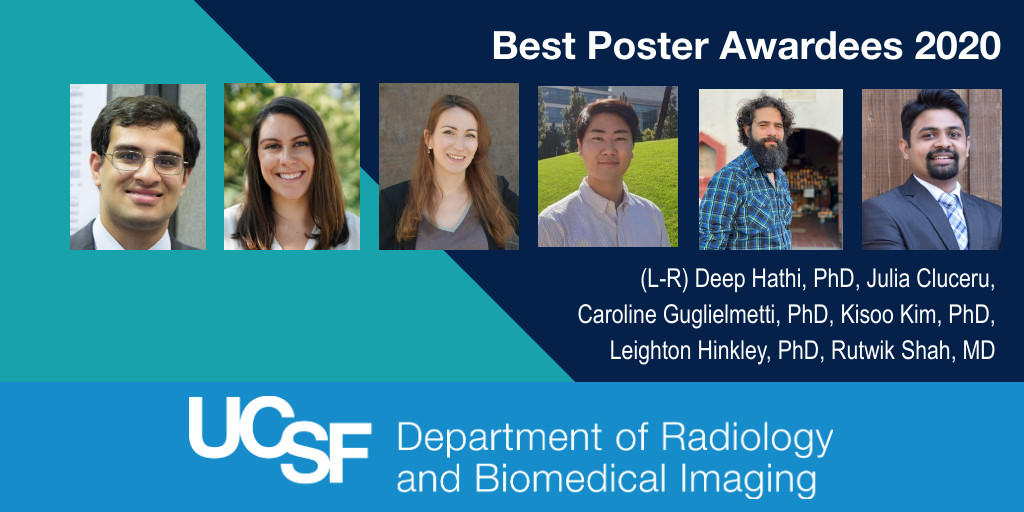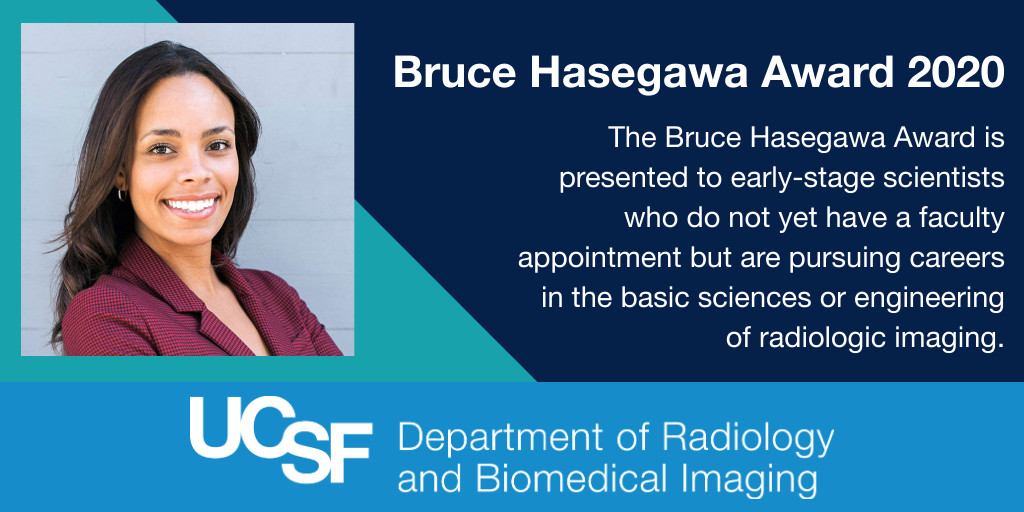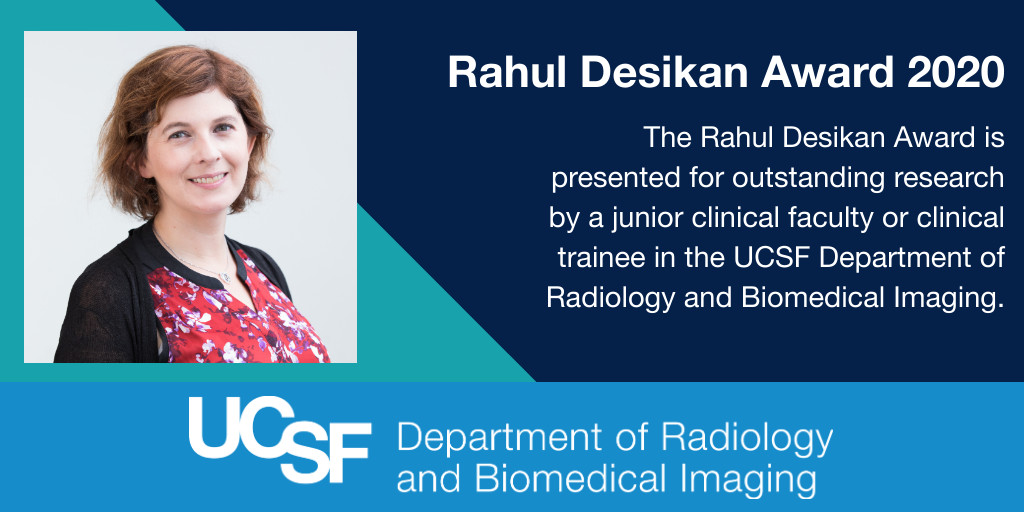A Recap of the UCSF Radiology 17th Annual Imaging Research Symposium
The 17th Annual Imaging Research Symposium was held virtually for the first time on Wednesday, October 14, 2020. Each year, the symposium is open to all in the UCSF and scientific communities to highlight the breadth and depth of innovative research being done in the department. The symposium is planned by the UC San Francisco Department of Radiology and Biomedical Imaging’s Seminar and Presentation Committee, led by co-chairs Janine Lupo, PhD (associate professor) and Michael Ohliger, MD, PhD (associate professor in residence). Valentina Pedoia, PhD, assistant professor, was program chair of the symposium. This year’s virtual symposium began with welcome remarks from Chair Christopher Hess, MD, PhD, and Vice Chair of Research Sharmila Majumdar, PhD.
Podium Presentations
There were two sessions of podium presentations featuring 16 speakers. Each speaker presented for eight minutes, followed by two minutes for audience questions. Thank you to Valentina Pedoia, PhD and Z. Jane Wang, MD for moderating the first session and Michael Heller, MD and Janine Lupo, PhD for moderating the second session.
Best Podium Presentation Awardee
The winner of this year’s best podium presentation is Le Wen Chiu, a third-year MD candidate in the UCSF School of Medicine. Her mentor is Robert Flavell, MD, chief of Molecular Imaging and Therapeutics.

In this presentation Le Wen Chiu discussed how prostate-specific membrane antigen uptake is present in both benign and malignant bone lesions, leading to false-positive findings on 68Ga-PSMA-11 PET. With consideration of the simultaneous CT and MR images, PSMA-RADS rating, SUVmax, and SUVmax ratio of lesion to blood pool can help differentiate benign from malignant lesions on 68Ga-PSMA-11 PET.
Poster Sessions

This year, posters were divided by topic into six virtual poster sessions featuring a three-minute presentation from each poster presenter and the opportunity for audience questions directed to each poster presenter. The Best Poster Awardees for each category are as follows:
- Cancer
Deep Hathi, PhD for his poster highlighting the Evaluation of Primary Breast Cancers using Dedicated Breast PET and Whole-body PET.
- Deep Learning
Julia Cluceru for her poster on Automatic Stratification of Gliomas into WHO 2016 Molecular Subtypes Using Diffusion-Weighted Imaging and a Pre-Trained Deep Neural Network.
- Hyperpolarized C13 Imaging
Caroline Guglielmetti, PhD for her poster on Hyperpolarized 13C MRSI of Pyruvate and Urea Detects Immunomodulatory Therapy Response in a Multiple Sclerosis Model.
- Methodological and Device Development or Testing
Kisoo Kim, PhD for his poster explaining Motion-robust, Multi-Slice, Real-Time MR PRFS Thermometry for MR-Guided Ultrasound Thermal Therapy In Abdominal Organs.
- Neuroimaging
Leighton Hinkley, PhD for his poster on Anomalous Language Lateralization in Adults with Reading Disability as a Consequence of Reduced Left-sided Occipito-temporal Activation
- Novel Methods for Clinical and Preclinical Studies
Rutwik Shah, MD for his poster on Swarm Intelligence: A Novel Clinical Strategy for Improving Imaging Annotation Accuracy, using Wisdom of the Crowds.
Bruce Hasegawa Award 2020

This year’s Bruce Hasegawa Awardee is Melanie Morrison, PhD, postdoctoral scholar. According to the selection committee, “Dr. Morrison exemplifies the spirit and legacy of the Bruce Hasagawa PhD award, which recognizes an early stage scientist already making an impact in the field of biomedical imaging.”
The committee indicated that that her recent first-authored paper was particularly notable “since it represents a new and independent direction of research in the area of neuroimaging, specifically the development of proton density MRI and diffusion tractography to visualize and target Deep Brain Stimulation (DBS) for the treatment of Essential Tremor.” Through this work, Melanie is developing an exciting new programmatic collaboration with the Neuromodulation Center (MDNC) at UCSF.
The committee also noted that: “Melanie has shown strong research productivity, with over 20 peer-reviewed manuscripts, of which she was first author on 10. She has an impressive list of honors and awards, including several recognitions in 2020:
- Post-doc Independent Research Grant by the Program for Breakthrough Biomedical Research (2020)
- UC Chancellor’s Postdoctoral Fellowship Award (2020)
- UCSF Regeneron Prize Finalist (2020)
- Magna cum Laude Award for abstract at the ISMRM (2020)
Melanie is also an active teacher and mentor with growing recognition for her scientific expertise and leadership in neuroimaging.
Rahul Desikan Award 2020

This year’s awardee is Courtney Lawhn Heath, MD, assistant professor. Dr. Lawhn Heath was selected for this award for her “deep and genuine commitment to research in molecular imaging. Dr. Lawhn Heath recently first authored a published paper entitled Intra-arterial Peptide Receptor Radionuclide Therapy using 90Y DOTATOC for Hepatic Metastases of Neuroendrocrine Tumors, that was highly significant in terms of potential clinical impact.”
In addition to this paper, the committee was “impressed by the number of publications published and scientific posters and educational exhibits accepted in 2020. Her contributions and dedication to science are demonstrated by her recent accomplishments.” The committee also noted that “In 2020, Dr. Lawhn Heath had the honor of being selected for the Future Leaders Academy, Society of Nuclear Medicine and Molecular Imaging. In 2019, She was recipient of the Robert E. Henkin Government Relations Fellowship, for Society of Nuclear Medicine and Molecular Imaging, and the NorCal Carcinet Travel Grant, for the North American Neuroendocrine Tumor Society Annual Meeting.”
